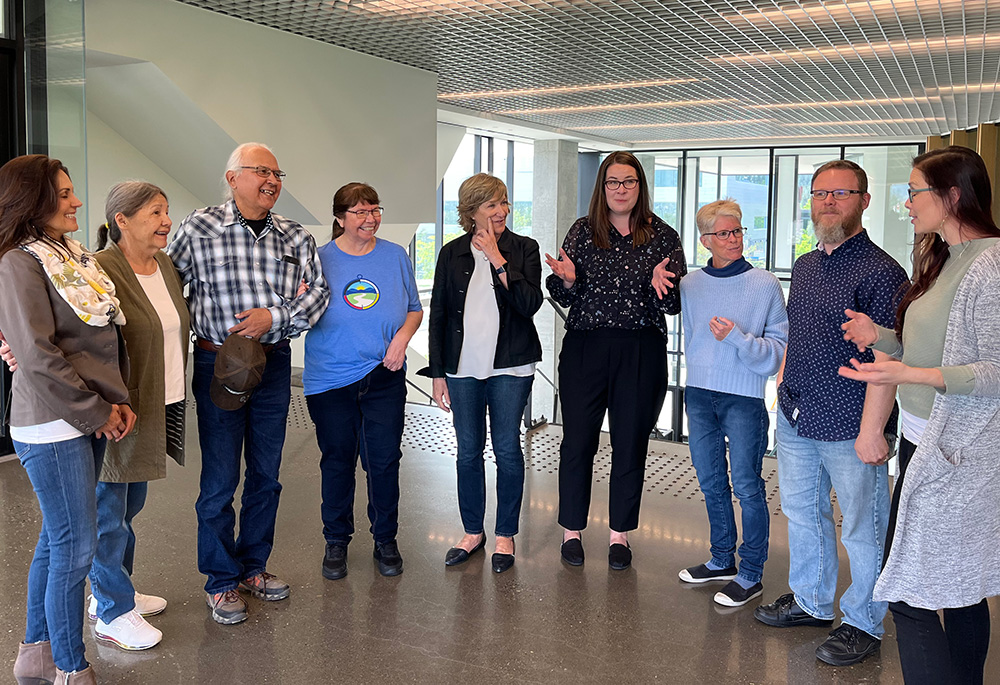
Elders, community organizations, and UBCO students, faculty, staff and researchers gathered to celebrate UBC Indigenous Strategic Strategies funding of a new Indigenous Graduate Nursing Education Pathway. Some Home Circle members are included in the photo (from left): Amber Froste Nlaka’pamux Tribal Nation, UBC MSN student, Elder Advisor Diana Moar Berens River First Nation, Elder Advisor Eric Mitchell Okanagan Indian Band, Karlyn Olsen UBCO School of Nursing, Elder Advisor Chris Marchand Okanagan Indian Band, April Coulson, Tr’ondëk Hwëch’in Nation, and Kathy Rush, Donna Kurtz and Dennis Jasper from the UBCO School of Nursing.
On its committed path to reconciliation, UBC Okanagan has taken another step forward—this time exploring a new aspect of thematic instruction in the Master of Science in Nursing (MSN) program.
The university has introduced this new layer of thematic instruction specifically for Indigenous registered nurses or registered nurses who work with Indigenous peoples, organizations or communities. The goal is to address racism in the health-care industry—and support Indigenous nurses or nurses working with Indigenous Peoples, organizations and agencies—while meeting community-identified needs and processes of incorporating Indigenous knowledge within mainstream nursing education and practice, explains Dr. Donna Kurtz, an Associate Professor with UBCO’s School of Nursing.
“Canada’s universal health-care system is one of the best in the world, yet Indigenous Peoples continue to experience poor health outcomes due to colonialism and racism,” says Dr. Kurtz, an Indigenous scholar and nurse working with interdisciplinary Indigenous community-led health promotion research and programs since 2003. “Nurses are central to health program development, implementation, improvement and maintenance. They are pivotal in working holistically with Indigenous communities for mental wellness, health promotion, illness prevention and even the fallout from the COVID-19 pandemic.”
The Canadian Institutes of Health Research has contributed $683,000 to develop the initiative delivered on the two UBC campuses and at Thompson Rivers University, the University of Victoria, Trinity Western University and the University of Northern British Columbia. This project is led by the University of Victoria’s Dr. Bourque Bearskin.
In addition, UBC’s Indigenous Strategic Initiatives Fund has provided $99,900 to establish an Okanagan community-led decision-making Home Circle as part of the provincial collective.
“There is currently no other collaboration or program like this taking place across Canada,” Dr Kurtz adds. “Nursing education programs continue to be dominated by Eurocentric knowledge and neo-liberal professionalization practices. Essential Indigenous health, cultural safety and cultural humility knowledges are lacking and few mandatory courses address the unique health needs and history of Indigenous populations.”
To help design the local MSN pathway, Okanagan Indian Band Elder Advisors Chris Marchand and Eric Mitchell, and Berens River First Nation Elder Diana Moar, along with Indigenous graduate nursing students, community leaders, members and organizations will be involved in curriculum content, redesign, delivery, evaluation and knowledge sharing.
Enrolled students will have two directions to take their studies. One includes a program with more than 70 hours of Indigenous-specific practicum work. The other is a thesis-based program where students will work on research projects led by Indigenous scholars, communities and organizations. Both can be done full- or part-time.
“This project is an important step towards creating a truly Indigenous-focused education program,” says Jackie Denison, Interim Director for the School of Nursing. “The stream will enhance the navigation of graduate studies for Indigenous nurses. Students will receive a strength-based Indigenized curriculum, which will offer a unique opportunity to learn from Indigenous communities from across the province.”
Throughout their studies, students will be mentored by Elders, Knowledge Keepers, Healers and Indigenous community leaders. They will also be able to take Indigenous-specific MSN courses at any of the universities participating in this program.
With current and newly established relationships across UBC, Dr. Kurtz says this project will identify priorities for change. Those priorities aim to inform and transform Indigenous anti-racist and inclusive curricula through co-developed pathways for ethical and respectful community-led and relevant research pathways and student practicums.
The eventual goal is to increase the number of Indigenous nurses within the Canadian workforce and improve Indigenous health while teaching and mentoring students, faculty and nurses to contribute to anti-racism and health equity through sustainable respectful collaboration.
“We need to address systemic racism,” she adds. “And we need the development of new practice standards for anti-racist, culturally safe, humble and responsive care to ensure health delivery systems are safer for all First Nations, Inuit and Métis Peoples.”
To learn more about UBCO’s Indigenous Master of Science in Nursing pathway visit: nursing.ok.ubc.ca/indigenous-initiatives